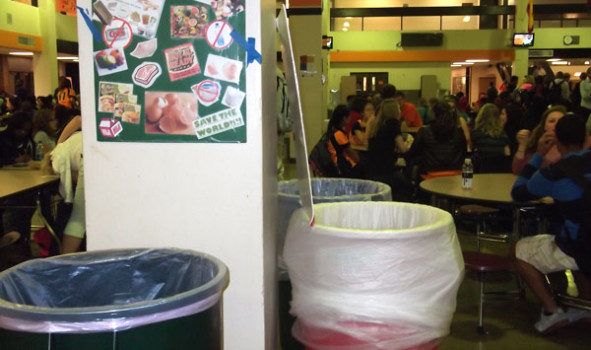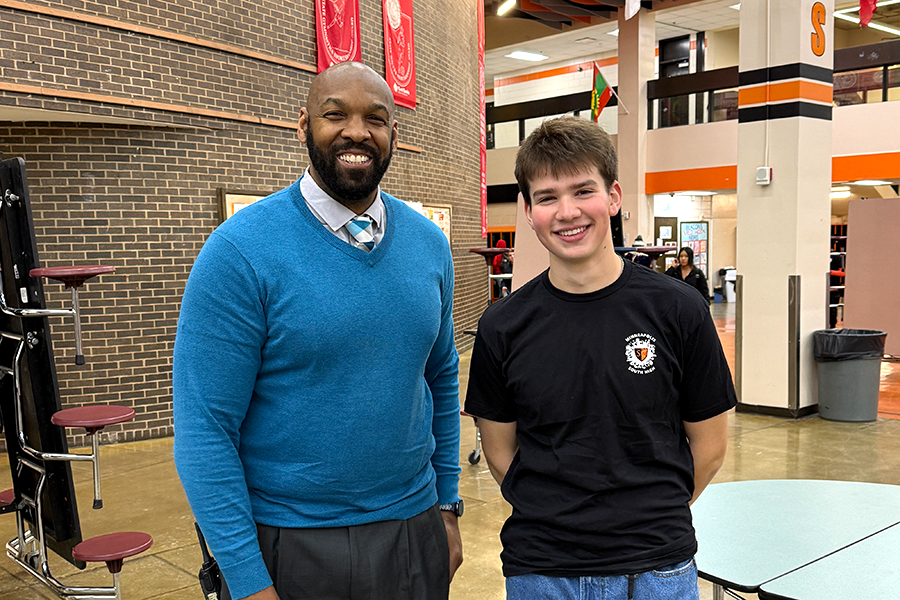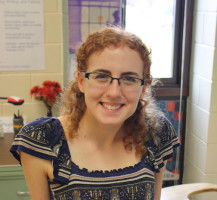South’s walls are grey, its floors take on a dirty, grey sheen, and the ceiling verges on the same color of dusty cream. However, as of April 9th, South is taking another step to go green. Thanks to the efforts of Green Tigers environmental group, in partnership with other student organizations at South like NHS, a new composting program has been implemented in all three lunches.
“I think it’s going pretty well,” said senior Rachel Kranz, the president of Green Tigers. “I think people are starting to get the hang of it.”
Composting has been in place for two weeks, but planning took much longer.
“We’ve been thinking about it for a long time. We started thinking about it more last year, and we just didn’t really know how to start it up,” Kranz said.
This year, sophomore Shira Breen, another member of Green Tigers was at the head of implementing the new project.
“I contacted the Minneapolis Goes Green intern of the district, and she helped us figure out how to start the program,” Breen said, “but everyone in Green Tigers has been really great, and motivated to make it happen, so we just kind of got through the obstacles.”
Funding for composting came directly from the district. Minneapolis Public Schools has a district-wide program named “Let’s R.O.T,” or Recycle Our Trash. They provided everything from the bins to the ‘nifty nabbers’ that put trash in its rightful place.
One of the major obstacles the group expected was in the introductory phase. Despite posters and announcements before and during the start of composting, there were concerns among the Green Tigers about whether South students would be willing to sort their trash.
“A lot of people just don’t have the motivation to divide up all of their trash,” said Breen, noting that this concern was realized once the program started. “People don’t care as much about composting or about even throwing their trash away to divide it up and figure out which bins stuff goes in.”
Kranz was surprised when, as a part of this sentiment, many people approached her with another request.
“They’ve been like, ‘Oh this is annoying, we have to sort it. I wish that everything was compostable,’” Kranz said. “So we’ve been talking a lot about trying for next year to get everything to be compostable, or more of it [lunch].”
Until a larger part of the lunches are compostable, Breen emphasized the importance of sorting trash.
“If stuff goes in the wrong bin, the company that picks it up might not accept it, and it could end the composting program,” Breen said.
Another worry spot was in trying to get the school to accept composting. First they approached Principal Cecilia Saddler and Head Engineer Tom Wassmund, who both supported the program. Next, they turned to the school at large.
Using announcements, posters, teachers, facebook, and classroom presentations the composting team spread awareness about the new measures. One common question Kranz received from teachers was whether composting would be sustainable at South. For Kranz, however, the answer is simple.
“We thought if elementary schools can do it, it makes sense that why shouldn’t high schoolers be able to do it too,” Kranz laughed.
Overall, both Breen and Kranz have felt mostly support from the South population.
“A lot of students have also shown their support, which is great,” Breen added administrators and teachers to her list of supporters who have helped composting on its way to South.
Success has already been seen through the changes composting has started.
“We throw away so much trash every day, and there’s super easy ways that we can not throw away this much trash,” Breen said, “even in the first week of composting, when people didn’t really know about it . . . we saved one out of every six trash bags . . . We have so much potential to improve, and for so much trash to be saved.”








